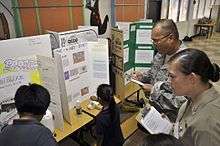Science fair

A science fair experiment is generally a competition where contestants present their science project, results in the form of a report, display board, and/or models that they have created. Science fairs allow students in elementary, middle and high schools to compete in science and/or technology activities.[1] The main motive of a science fair is for students to answer a question or task, not from a textbook but found out themselves by conducting a range of experiments and ongoing research in the short amount of time allocated to them. In order that the questions or tasks spark a true interest in the student they should be able to have an interesting, eye catching project often portrayed on a display board.
Science fairs also provide a mechanism for students with intense interest in the sciences to be paired with mentors from nearby colleges and universities, so that they can access to instruction and equipment that the local schools can not provide.
History
Science fairs date back to 1942, when William Emerson Ritter and Edward W. Scripps created "The Science Talent Search" for high school students. The first American National Science Fair was won by Alan J. Fletcher when he was 18, winning with a display on the laws of motion. In the United States, science fairs became popular in the early 1950s. Interest in the sciences was at a new high after the world witnessed the use of the first two atomic weapons and the dawn of television. As the decade progressed, science stories in the news, such as Jonas Salk's vaccine for polio and the launch of Sputnik, brought science fiction to reality and attracted increasing numbers of students to fairs.[2]
See also
References
- ↑ Fredericks, Anthony D. (2000). "What is a science fair project?". Science Fair Handbook. Houghton Mifflin Company. Retrieved 8 March 2018.
- ↑ Cox, Jimmy. "A History of Science Fairs". Streetdirectory. Retrieved 8 March 2018.
Further reading
- Haysom, John (2013). Science fair warm-up : learning the practice of scientists. Arlington, Va.: NSTA. ISBN 9781936959235.
- Schank, Hana (12 March 2015). "Science Fairs Aren't So Fair". The Atlantic. Retrieved 8 March 2018.